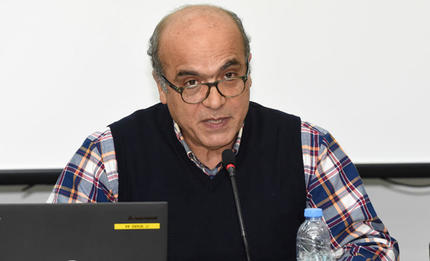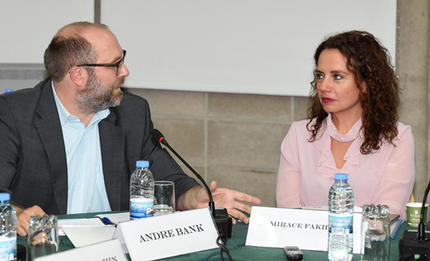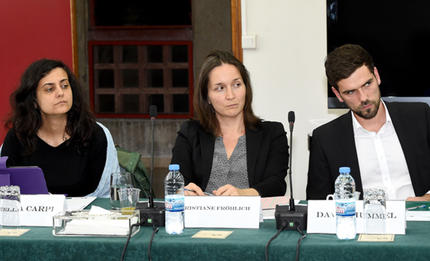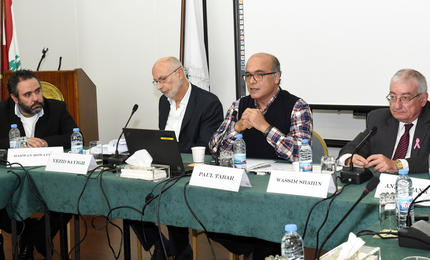Syria’s displacement: The politics of reception in Lebanon, Jordan and Turkey
Three-day conference hosted by LAU tackles a critical subject from a cross-comparative and multi-disciplinary perspective.

Director of the Institute for Migration Studies Paul Tabar chaired the panel on the politics of reception in Lebanon in the context of the Syrian displacement.

GIGA Senior researcher André Bank and LAU Associate Professor of Political Science and International Affairs Tamirace Fakhoury co-organized the conference in collaboration with the Department of Social Sciences and the Institute for Migration Studies.

GIGA Research Assistant David Hummel, with speakers Christiane Fröhlich and Estella Carpi, who addressed the notion of citizenship and security dynamics in Lebanon respectively.

Chairperson of the Department of Social Sciences Marwan Rowayheb, with keynote speaker Yezid Sayigh, senior fellow at the Carnegie Middle East Center in Beirut, Director of the Institute for Migration Studies Paul Tabar, and Assistant Provost for Special External Projects Wassim Shahin.
LAU’s Department of Social Sciences and the Institute for Migration Studies (IMS), together with the German Institute of Global and Area Studies in Hamburg (GIGA), held a three-day cross-disciplinary conference on November 1-3 on Byblos campus, titled “The Politics of Reception: Syria’s Neighborhood as a Social field.”
The event brought together an interdisciplinary group of 25 junior and senior researchers from Europe, the Middle East and the United States, specialized in a wide array of fields from political science, anthropology, migration studies, to peace and conflict studies. In an innovative approach, the participants not only compared Lebanon, Jordan and Turkey as refugee host countries, but also drew on examples from other regions, such as East Africa and Latin America.
Welcoming the guests, Assistant Provost for Special External Projects Wassim Shahin described the issue at hand as one of geography par excellence. He expressed his hope that humanitarian interventionism will lead to the “defeat of geography” instead of what author Robert Kaplan called the “revenge of geography.”
Keynote speaker Yezid Sayigh, senior fellow at the Carnegie Middle East Center in Beirut, then asked the participants to play around with the concepts of migrants and refugees, underlining how we create categories to fit each word. Addressing the notion of space and what it represented politically and culturally, he raised the question of “which space is ours,” and “which space is somebody else’s.”
The conference treated different aspects of the politics of reception in refugee host countries, including local security, and local moral economies. Tackling Lebanon’s response to Syrian displacement, Associate Professor of Social Science and International Affairs and co-organizer of the event Tamirace Fakhoury shed light on “how the resulting policy formulation processes and discourse have constructed the relationship between the hosting state and the refugees.” Lebanon’s sectarian politics, she argued, have “extracted gains from the displacement” of more than one million refugees to Lebanon.
Jordan’s refugee policy, on the other hand, expounded GIGA Senior Researcher and co-organizer André Bank, was characterized with “persistent ambiguities,” in terms of state numbers, policy of encampment and work permits.
In a comparative discourse on Turkey, Postdoctoral Researcher at the University of Hamburg Christiane Fröhlich touched on the concept of citizenship. Inviting the participants to consider the possibility of going beyond what a “cosmopolitan citizenship would be like, in order to achieve sustainable integration,” she recommended that “the problem of refugees and mobility in general” be viewed “through the cosmopolitan lens.”
As opposed to the institutional and political angles adopted by the first panel, the second focused on local security dynamics and transformations since 2011 in Syria’s neighboring countries. Addressing these issues in Lebanon, Estella Carpi, research associate at the University College London, highlighted the absence of “clear policies on securities” in the country’s small towns and villages through a case study of Ebrine in the north.
Associate Professor of Political Science and International Affairs and Chairperson of the Department of Social Sciences Marwan Rowayheb moderated a discussion by panelists Paul Tabar, director of IMS, Ann-Christin Wagner from the University of Edinburgh and Evrim Görmüş from MEF University Istanbul, who explored the intricate relationships between local moral economies, governance and refugee agencies at both the national and local levels.
Although the workshop centered on the politics of reception in Syria’s immediate neighborhood, talks brought in other contexts. On the third and final day of the conference, Libyan panelist, Houda Mzioudet, a non-resident researcher with Carnegie, offered insights on how the 2011 turmoil had changed the lives of exiled Libyans in Tunisia and Tunisian migrants in Libya, while Stefanie Wodrig, research fellow at the University of Kiel and Sabine Kurtenbach, senior research fellow at GIGA, drew inspiration from the refugee crises in East Africa and Latin America respectively.
The conference ended with the participants considering the possibility of publishing a special issue or an edited volume on the topic.
More
Latest Stories
- Translation Workshop Widens Students’ Career Horizons
- LAU Engages High Schoolers With Creative Expression and Scholarship Awards
- How Does Digital Media Impact Our Brain?
- Community Development Takes Root at Capstone Presentation Day
- LAU Athletes Return Victorious from Athens and Belgrade
- A New Initiative Toward Harnessing Digital Transformation
- Quality Childcare is the Key to Women’s Empowerment in the Workforce
- A Cardiovascular Conference to Streamline National Expertise

